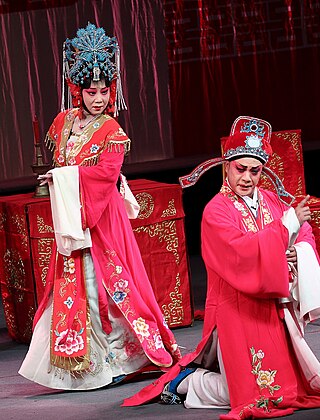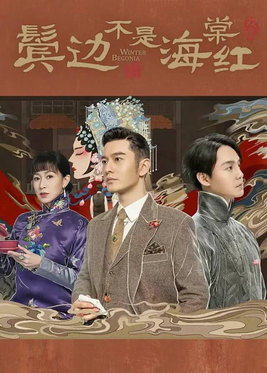Related Research Articles

Kunqu, also known as Kunju (崑劇), K'un-ch'ü, Kun opera or Kunqu Opera, is one of the oldest extant forms of Chinese opera. It evolved from a music style local to Kunshan, part of the Wu cultural area, and later came to dominate Chinese theater from the 16th to the 18th centuries. It has been listed as one of the Masterpieces of the Oral and Intangible Heritage of Humanity by UNESCO. Wei Liangfu refined the musical style of kunqu, and it gained widespread popularity when Liang Chenyu used the style in his drama Huansha ji. In 2006, it was listed on the first national intangible cultural heritage list. In 2008, it was included in the List of Representative Works of Intangible Cultural Heritage of Humanity. In December 2018, the General Office of the Ministry of Education announced that Peking University is the base for inheriting excellent traditional Chinese culture in Kunqu.

The White-Haired Girl is a Chinese contemporary classical opera by Yan Jinxuan to a Chinese libretto by He Jingzhi and Ding Yi. It was later adapted to a ballet, a Peking opera, and a film. The ballet adaptation was regarded as a revolutionary opera.

Mei Lan, better known by his stage name Mei Lanfang, was a notable Chinese Peking opera artist in modern Chinese theater. Mei was known as the "Queen of Peking Opera". Mei was exclusively known for his female lead roles (dan) and particularly his "verdant-robed girls" (qingyi), young or middle-aged women of grace and refinement. He was considered one of the "Four Great Dan", along with Shang Xiaoyun, Cheng Yanqiu, and Xun Huisheng.
Cheng Yanqiu was a Chinese Peking opera singer. He is remembered as one of the 20th-century's great female impersonators, having specialized in Peking opera's female roles (dan). Yanqiu was a member of the Chinese Communist Party and was buried in Babaoshan Revolutionary Cemetery.

Yu opera, or Yuju opera, sometimes known as Henan bangzi, is one of China's famous national opera forms, alongside Peking opera, Yue opera, Huangmei opera and Pingju. Henan province is the origin of Yu opera. Henan's one-character abbreviation is "豫" (yù), and thus the opera style was officially named "豫剧" (Yùjù) after the founding of the People's Republic of China. The area where Yu opera is most commonly performed is in the region surrounding the Yellow River and Huai River. According to statistical figures, Yu opera was the leading opera genre in terms of the number of performers and troupes. While Yu opera is often called "Henan opera" in English, within Henan it is considered to be just one of the province's three most important forms of opera, the other two being Quju (曲剧) and Yuediao (越调).
The Jiangsu Performing Arts Group, or JPAG, is a theater company established in 2001 and based in Nanjing, Jiangsu, China. It is one of the largest performing arts groups in China and has won eighteen Plum Blossom Prizes and twenty-one Wen Hua Awards. It has also been named "National Key Enterprise for Cultural Export" six times. The group participates in the Chinese Cultural System Reformation.
Tan Jing is a solo Chinese singer in the CPC Central Military Commission Political Department Song and Dance Troupe and a first class national actress. Her music blends bel canto, Chinese national music (Guoyue), and popular singing styles. She has been dubbed "The Voice of Harmony" for her efforts to spread Chinese music, culture, and goodwill through her professional and philanthropic contributions.

Li Yugang is a Chinese singer, artist, the soloist of China National Opera & Dance Drama Theater and national first class actor. He specialises in "nándàn" (男旦) roles, which is male who plays female role in Peking opera and is also known for his ability to sing in both male and female voices. Li has released a number of CDs.

Yu Kuizhi is a Peking opera performer of Hui Chinese ethnicity. He plays the role of elderly men (laosheng) in Peking Opera.
Li Liuyi is a Chinese director and playwright of Beijing People's Art Theatre. His theory "Pure Drama" and his related exploration in the field are known as "Li Liuyi Methodology", which is widely acclaimed and researched. Japanese modern theater master Tadashi Suzuki calls him "The most influential stage artist of Asia in the new century".
Li Shuzhen, better known by her stage name Li Yuru and also known as Li Xueying, was a Chinese opera singer and actress. Descended from Manchu nobility, she is remembered as "one of the great Beijing Opera performers" and played an important role in the acceptance of female singers in female roles (dan). Amid the Cultural Revolution, she was imprisoned from 1966 until the early 1970s. In 1979, she married Cao Yu, one of the most important 20th-century Chinese dramatists, and, following China's opening up under Deng Xiaoping, she ended her life respected as one of the few surviving masters of the dan roles.
Ma Li is a Chinese actress. She was born on June 28, 1982 in Kuandian Manchu Autonomous County, Dandong City, Liaoning Province. She graduated from the Performance Department of the Central Academy of Drama and the Institute of Drama of Peking University. She is an actress in Mainland China.

Li Pei, was a Chinese linguist and professor of English.
Vera Tsu Weiling is a professional violinist and Professor and Master tutor of the Central Conservatory in Beijing and Shanghai Conservatory. She is featured in the Academy Award winning documentary From Mao to Mozart: Isaac Stern in China, directed by Murray Lerner. Tsu Weiling serves as co-chairman of the Shanghai Isaac Stern International Violin Competition and vice-president of the China Violin Society.
Li Shengsu is a Chinese Peking opera singer-actress who plays Dan roles. She began performing traditional Chinese opera from a young age and is a student of Mei Baojiu and other famous opera performers. She is widely considered a Peking opera superstar and has many renown performances. Currently, Li Shengsu is the director of Troupe One of China National Peking Opera Company. Li also holds positions in other organizations as well, including being a member of the Chinese People's Political Consultative Conference. She has received multiple awards and recognition for her performance in Peking opera.
Fan Jinshi is a Chinese archaeologist and heritage specialist who served as director of the Dunhuang Research Academy between 1998 and 2014. She spends most of her life in Mogao Caves, Dunhuang, currently working as an honorary president and professional researcher in Dunhuang Research Academy, as well as a part-time professor and a doctoral supervisor in Lanzhou University. Fan began working in Dunhuang in 1963, at the age of 25. She has been venerated as "Daughter of Dunhuang" for her over 50 years of devotion to studying and preserving the Dunhuang Grottoes. She was an early proponent of the Dunhuang Academy in contemporary China, and pioneered a series of effective preservation approaches for grottos.
Zuo Dabin, also known by her art name Honghui (红辉), is a Chinese actress and educator best known for her role as Guanyin in Journey to the West.

Winter Begonia is a 2020 Chinese television series starring Huang Xiaoming, Yin Zheng, and Charmaine Sheh, based on Shui Ru Tian Er's BL web novel of the same name. It aired exclusively on iQiyi and tells the story of the close relationship between a shrewd businessman and a Peking opera genius right before the World War II. While the original web novel depicted the relationship between the two main men as romantic, the adaptation changed this depiction into a "bromance".

Professional schools for Chinese opera, known as keban, existed in China from the Ming dynasty (1368–1644) to the 20th century. Formerly attached to performing troupes, many keban became independent boarding schools by the late 19th century.

Shajiabang ; first produced under the title Sparks Amid the Reeds, is a Chinese revolutionary opera and one of the eight "model plays" permitted during the Cultural Revolution.
References
- 1 2 "Peking Opera Show to Mark New Year Celebration". chinadaily.com.cn. December 16, 2016. Retrieved December 4, 2018.
- 1 2 "Peking Opera at Forbidden City". chinadaily.com.cn. February 5, 2010. Retrieved December 4, 2018.
- ↑ "Veteran reinvests classic tale". chinadaily.com.cn. November 20, 2015. Retrieved December 4, 2018.